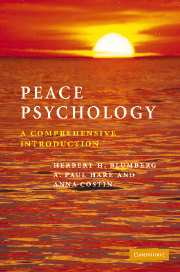The scope, structure and content of this book
Published online by Cambridge University Press: 05 June 2012
Summary
The present volume covers, as far as feasible, the whole post-Cold War research literature for the practically and theoretically important area now known as peace psychology. This area includes a spectrum of topics drawn from psychology and its interfaces with other disciplines insofar as they relate to peace and conflict resolution primarily, but by no means exclusively, in an international context. The area is of widespread interest to practitioners, to academics (there being, for example, a substantial number of university courses in peace studies, including psychological aspects) and to the general public.
Psychology's major contributions to conflict resolution and peace studies are, for the most part, fairly readily retrievable, for instance from the key compendia named below. The breadth of published papers within this area is, however, less retrievable, being dispersed across journals and books covering most of the behavioural and social sciences.
Primary present coverage is of the post-Cold War period from 1990 to 2003. Of course we do not hesitate to cite major earlier work, but to include it comprehensively would be beyond the scope of a single volume. Moreover, pre-1990 classified bibliographic work is already available in a volume compiled by Blumberg and French (1992) and also compilations by B. M. Kramer and Moyer (1991) and Müller-Brettel (1993a).
- Type
- Chapter
- Information
- Peace PsychologyA Comprehensive Introduction, pp. ix - xivPublisher: Cambridge University PressPrint publication year: 2006



